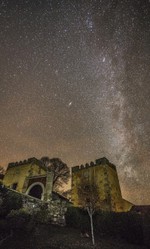Plato gave us the famous simile of the cave.He tells of how a group of people are chained in a cave, where they only see shadows of the objects in the real world thrown by the light of a fire. One man escapes and climbs from the cave to the real world lit by the light of the sun,which represents the highest form, the form of the Good. He is the one who has gained wisdom. Eventually he is able to look at the sun the source of all wisdom. But when he returns to the cave to enlighten his fellows they belittle him, for they are trapped in un-wisdom. In Plato's view wisdom consists of knowing a higher world than this one, the world of the forms. For example,there is the form of woman, in which all woman participate, and it is better to know the form of woman than it is to know any individual woman,and there is a whole range of forms in this higher world. For Plato knowledge of the world, practical or in our day scientific knowledge is mere belief, pistis. Wisdom comes with the knowledge of the forms. There is dianoia, mathematical wisdom, which is knowledge of the forms not dependent upon the form of the good. Then there is episteme or noesis, the knowledge of the forms dependent upon the form of the Good, such as justice and moral concepts.
For Plato the pursuit of wisdom was an elite task, and only a few men and even fewer women were capable of achieving it. Only those who had gained wisdom were fit to rule in Plato's ideal world. It was he who produced the ideal of the philosopher-king. No one now accepts Plato's view of the forms, but he was a philosopher very influential in the intellectual history of Europe, and in the first millennium until Aquinas Catholic philosophy was deeply influence by Plato's ideas.
But the Eastern religions have their own wisdom traditions, and there is in their religious life a search for enlightenment. Hinduism is very complicated, too much for me to go through in an article, but Hindu holy men have long thought that humans suffer from maya [illusion] so the job of religion is to cut through the web of maya to achieve a true knowledge of the world, which in Hindu thought manifests God. This is done by a long and devoted course of meditation and self-denial.
Buddhism inherits the Hindu tradition in some ways, but broke from it. Buddhists replace illusion with delusion. Whereas illusion is a false view of reality, delusion is false understandings of the self and values, which lead to dukkha [suffering.] But the remedy in the two faiths is similar, a course of meditation under a wise guru who can led initiates into the higher way of wisdom. This is combined with ascetism, which in Buddhism follows the middle way between the extremes of ascetic practice and a non-ascetic life style, for Buddha was wise enough to have discovered that extreme asceticism leads nowhere.









 Darkness over the Earth the skies darkened when Jesus was crucified17 days ago
Darkness over the Earth the skies darkened when Jesus was crucified17 days ago
 TheThousand Year Gardenon 11/26/2025
TheThousand Year Gardenon 11/26/2025
 Women of the Gospelson 10/11/2025
Women of the Gospelson 10/11/2025
 Religious Gardenson 08/25/2025
Religious Gardenson 08/25/2025



Comments
Thenotherbemanationsvare Shekinah, glory, andbdabar, word. These were notnthoughtbofbeithervas male or female,
Thank you for your comment below in answer to my previous observation and question.
It intrigues me that wisdom is a "female emanation of God" in Hebrew spirituality.
Is there any other such outstanding emanations indicated as female?
No individual stands out, and while there were prophetesses there were no wise women, but if you look at the wisdom literature you will see that the Hebrews regarded wisdom as a female emanation of God
Thank you for your comment in answer to my previous, same-day observation and question.
The wisdom concept always associates in my mind with King Solomon.
Might there have been other individuals in the Old Testament who mustered wise reputations also? (Might there have been other wise men and ;-D some wise women?)
Who would be considered a wise man (or a wise woman ;-D) in the New Testament?
No, but it makes sense.
Thank you for your comment below in answer to my previous, same-day observations and question.
Some Unitedstatesians have a saying that questions whether one seeks happiness, health, wealth or wisdom. The answer suggests that all four will be possible through wisdom.
Would east-side ponders have that saying?
Yes.
Thank you for your comment in answer to my previous, same-day observation and question!
Your answer advises us of your daughter's family-therapy certificate, "the study for which is deemed to be at a masters level."
Does that study demand attending classes, going through a reading list, taking a series of exams or presentations or one final exam or presentation?
Certificates are considered to be at either bachelor's or masters. For example, my daughter is currently studying for a certificate in family therapy, the study for which is deemed to be at masters level, though it is notna full masters level course.
Thank you for your comment below on April 11, 2023, in answer to my previous observation and question April 10, 2023.
The east-ponder educational system intrigues me.
For example, where might a certificate fit within what perhaps musters as a university structure of undergraduate degree, master's degree and doctoral degree?